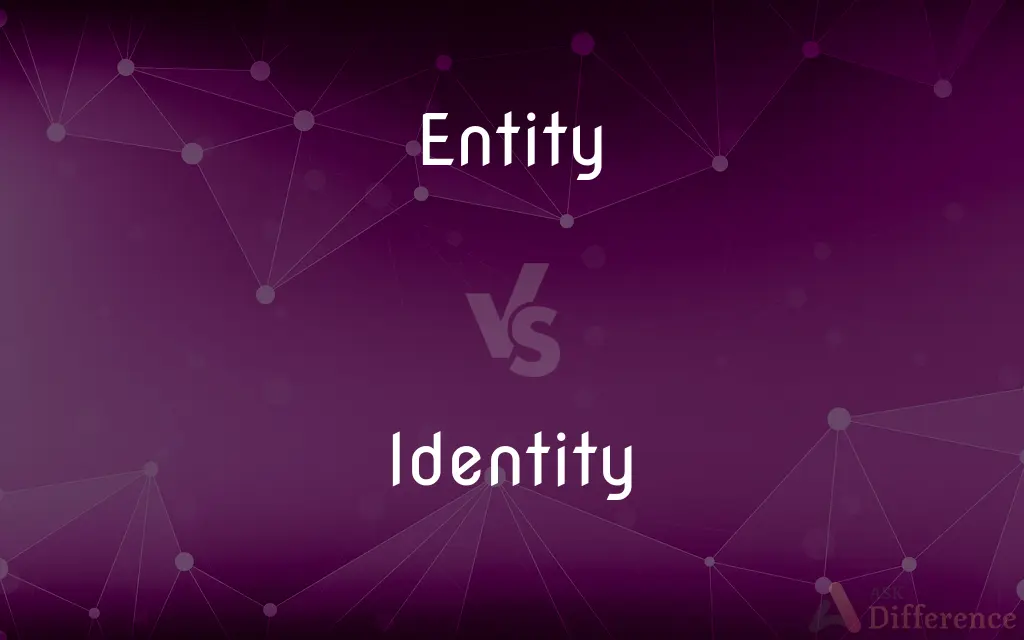Entity vs. Identity — What's the Difference?
By Urooj Arif & Fiza Rafique — Updated on February 27, 2024
An entity refers to any being or organization with a distinct existence, while identity is the set of characteristics or attributes that distinguishes an entity from others, defining its uniqueness.

Difference Between Entity and Identity
Table of Contents
ADVERTISEMENT
Key Differences
An entity can be understood as anything that exists independently, whether it's a person, corporation, state, or object. It is recognized for its separate and distinct existence in the physical or conceptual world. Identity, on the other hand, pertains to the qualities, beliefs, personality, looks, and/or expressions that make a person (self-identity) or group (collective identity) distinctive. Identity encompasses the aspects that differentiate one entity from another, providing a sense of self or group uniqueness.
Entities cover a broad spectrum, including living beings, corporations, governments, and non-profit organizations, each possessing its own legal and social recognition. Identity delves deeper into the characteristics that define these entities, such as cultural identity for groups or personal identity for individuals, shaped by experiences and interactions.
The concept of an entity is more general and can apply to anything with a distinct existence, identity is more specific, focusing on the distinguishing features of an entity. For example, a company (entity) may have a brand identity, which includes its logo, mission statement, and customer interactions that set it apart from competitors.
The distinction between entity and identity becomes crucial. Legal entities are recognized by law for purposes like taxation and liability, whereas identity can involve legal aspects such as nationality, but also includes personal choices and affiliations.
Understanding the relationship between an entity and its identity is fundamental in various disciplines, including sociology, psychology, business, and law. It helps in analyzing how entities interact within societies and markets, and how individuals or groups perceive themselves and are perceived by others.
ADVERTISEMENT
Comparison Chart
Definition
A being or organization with a distinct, independent existence.
The set of characteristics or attributes that distinguish an entity, defining uniqueness.
Scope
Broad, applies to any distinct existence.
Specific, focuses on distinguishing features.
Examples
People, corporations, states, objects.
Cultural, personal, brand identities.
Focus
Existence and recognition.
Characteristics and uniqueness.
Relevance
Legal, social, conceptual recognition.
Personal, cultural, and organizational differentiation.
Compare with Definitions
Entity
Broad Application.
Every object, from a small insect to a multinational company, is considered an entity.
Identity
Personal and Collective.
Cultural identity reflects the shared characteristics of a group.
Entity
Social and Conceptual Recognition.
Social groups are entities within cultural contexts.
Identity
Distinguishing Characteristics.
The artist's identity is shaped by unique creative expressions.
Entity
Ndependent Existence.
The corporation became a legal entity recognized by the government.
Identity
Influenced by Interaction.
Identity evolves through interactions with society and personal experiences.
Entity
Legal Recognition.
Non-profit organizations must register to be recognized as legal entities.
Identity
Brand Identity.
The company's brand identity is crafted through its logo, customer service, and marketing.
Entity
Physical or Conceptual.
Digital platforms are entities in the virtual space.
Identity
Legal and Philosophical Aspects.
Legal documents establish a person's national identity.
Entity
A thing with distinct and independent existence
Church and empire were fused in a single entity
Identity
The fact of being who or what a person or thing is
She believes she is the victim of mistaken identity
He knows the identity of the bombers
Entity
Something that exists as a particular and discrete unit
Persons and corporations are equivalent entities under the law.
Identity
The condition of being a certain person or thing
What is the identity of the author of the manuscript?.
Entity
The fact of existence; being.
Common Curiosities
Why is legal recognition important for an entity?
Legal recognition allows entities to operate within the legal framework, granting rights and imposing obligations.
How do entities influence identity?
Entities provide a context in which identities are shaped and expressed, influencing self-perception and external perception.
What role does culture play in identity?
Culture provides a framework of values, norms, and practices that significantly shape collective and individual identities.
What is the difference between an entity and its identity?
An entity refers to any independent existence, while identity defines the distinguishing characteristics of that entity.
How do psychological factors contribute to identity?
Psychological factors like self-perception, values, and beliefs are central to the development of personal identity.
What legal aspects are associated with identity?
Legal aspects include nationality, legal name, and rights and responsibilities under the law.
How is identity formed?
Identity is formed through a combination of inherent traits, experiences, choices, and social interactions.
Can identity change over time?
Yes, identity can evolve with new experiences, roles, and societal changes.
Can an entity exist without an identity?
While an entity can exist independently, its identity is what differentiates it and gives it meaning in relation to others.
How does brand identity differ from personal identity?
Brand identity is carefully crafted to reflect a company's values and offerings, whereas personal identity evolves naturally over time.
Can an entity have multiple identities?
Yes, an entity like a person or organization can have multiple identities depending on context, role, or perception.
What challenges arise in defining identity?
Defining identity can be complex due to its fluid nature and the influence of multiple internal and external factors.
How is identity important in the business world?
In business, identity helps companies differentiate themselves from competitors and connect with customers.
What is the significance of identity in social contexts?
Socially, identity influences how individuals are perceived and how they relate to larger groups or communities.
How does technology impact identity?
Technology shapes identity through digital personas, online interactions, and access to global cultures.
Share Your Discovery

Previous Comparison
Aseptic vs. Septic
Next Comparison
Tailstock vs. HeadstockAuthor Spotlight
Written by
Urooj ArifUrooj is a skilled content writer at Ask Difference, known for her exceptional ability to simplify complex topics into engaging and informative content. With a passion for research and a flair for clear, concise writing, she consistently delivers articles that resonate with our diverse audience.
Co-written by
Fiza RafiqueFiza Rafique is a skilled content writer at AskDifference.com, where she meticulously refines and enhances written pieces. Drawing from her vast editorial expertise, Fiza ensures clarity, accuracy, and precision in every article. Passionate about language, she continually seeks to elevate the quality of content for readers worldwide.
















































